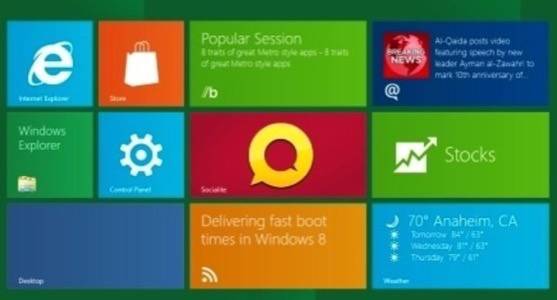
Microsoft is betting the farm on its new Windows 8 operating system. Ironically, some of the biggest challenges it faces come from earlier versions of Windows – and Microsoft’s own mistakes. Case in point: Windows 8’s highly touted “Metro” interface may have to change its name just as the program is about to be released.
What’s In a Name? Trouble!
It seems there’s possibly a bit of trademark trouble with the “Metro” name from German retail holding group Metro AG, which, among other assets, owns two electronics store chains (Media Markt and Saturn).
While an internal Microsoft memo appears to confirm that the Metro interface will be getting a new name, no one knows yet what the new moniker will be or officially why the change had to happen at this late date. The memo only cites “discussions with an important European partner” as the rationale. Microsoft has declined to comment.
In the grand scheme of things, of course, this is not a big deal. After all, few consumers could actually name the interface now used by Windows Vista and Windows 7: Aero. The only people likely to notice a Metro name change will be technology professionals and ultra-fans. Developers may also be annoyed at having to rename things in the applicaitons the’re already working on.

Still, it’s one more nagging headache that Microsoft didn’t need. Metro AG is not exactly unknown in tech circles. This should have been settled long before Microsoft invested any PR and marketing dollars on “Metro.”
Windows vs. Windows
Microsoft’s launch of Windows 8, already threatened by reports of declining Windows PC sales, has bigger issues than name changes.
Sure, Windows 8 will go head-to-head with rival operating systems like Apple’s OS X and open-source Linux, but by some measures its biggest competitors will be Microsoft’s own earlier releases of Windows.
You wouldn’t think that an 11-year-old operating system like Windows XP would be a big challenger for Windows 8, but it will be. According to the July 2012 survey from NetMarketShare, 42.86% of desktop machines STILL run Windows XP, just a smidge more than Windows 7, which is at 42.21%. (The epic fail of Windows Vista has fallen steadily from 9.09% in September 2011 to 6.60% in July 2012).
Based on the trendlines, it looks like August will finally be the month that Windows 7 does what Vista never even came close to doing: overtaking Windows XP.
This is the desktop market into which Windows 8 will be sold: 91.67% of machines already running Windows of some kind, and nearly half of those machines running an operating system that was released over a decade ago.
Microsoft is well aware of the challenge: sources have already outlined potential upgrade paths for XP, Vista, and Windows 7 users.
Upgrade or Switch?
Of course, the vast majority of those machines will never upgrade their version of Windows. And that won’t be helped by incomplete upgrade schemes:. For instance, only personal data can be migrated from XP Service Pack 3 or Vista to Windows 8 (Vista SP1 users will be able to migrate user settings as well). Only Windows 7 users will have an “easy” upgrade path to Windows 8 that will carry apps, data, and settings along.
Given that, the real opportunity clearly comes in selling new Windows 8 devices – from PCs to tablets. But getting users to abandon their existing Windows machines won’t be easy in the current economy – particularly for employers who have stubbornly refused to make the upgrade.
Even more worrisome for Microsoft in the long run, every time someone gives up on an aging Windows machine is an oportunity for them to abandon the Windows platform, going with OS X or Linux (or even iOS and Android on tablets) instead of Windows8.
In that kind of environment, with new Windows 8 machines competing with Windows 7, Vista and XP as well as OS X, Linux and various mobile operating systems, Microsoft can’t afford any stumbles. That’s what makes the Metro name change so worrisome.

















